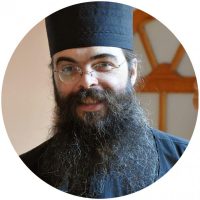When suffering is knocking at your door, when it is not in books, not in sermons or  conversations, but comes to you, to your family, this is what I would like to talk about today. Sometimes you can hear: “Take a walk in my shoes”, “Put yourself in my (his, their, etc.) place.” It’s easy to speak on such topics, but when a disaster strikes us, then what shall we do? How will we endure suffering, will we be able to stay on our feet, and not break? It is very difficult, and for many of us it is completely incomprehensible.
conversations, but comes to you, to your family, this is what I would like to talk about today. Sometimes you can hear: “Take a walk in my shoes”, “Put yourself in my (his, their, etc.) place.” It’s easy to speak on such topics, but when a disaster strikes us, then what shall we do? How will we endure suffering, will we be able to stay on our feet, and not break? It is very difficult, and for many of us it is completely incomprehensible.
Pain is always unpleasant. No one likes to suffer, be in torment and be sick at heart. Pain is unpleasant, but wholesome. And you understand that it is useful not when it hurts, but two, three or even five years later, looking back at your life. Then you understand that tough times have enriched your soul: you have learned to cry, forgive, love and have become stronger. Some people cry for the first time when they are in pain. I do not mean, for example, common migraine here. I am talking about pain that changes your whole life. For example, a person is going to marry and suddenly finds out that he is seriously ill or that his beloved is sick. And the ground crumbles under your feet, and you go crazy with grief, repeating: “Lord, Lord, how comes it? Why me?”
Who of us at least once in our life has not asked God such a question: “Why?” When something like this happens, we all say to Him: “Why, Lord?” We should not be afraid to ask this question: we are all human beings, and for us it’s natural to say such things to God. Remember how often the prophet and King David repeats this question in his psalms: “My God, my God, why did you leave me? Why did you forget about me? Why are you punishing me? Don’t you feel sorry for me? What kind of God are You? ”
All these days I receive e-mail messages from a girl from Cyprus. Her father died, and every day she writes me just one question: “Why did God do this to me?” And again: “Why didn’t He hear my prayers? Why did He allow all this? I think I’ll lose my mind soon … ”
When we begin a sermon at the moment of someone else’s suffering, we are doomed to failure. A suffering person does not need a sermon, does not need a lot of advice and consolations: this can only aggravate the situation. In the moment of suffering, people want only one thing: for someone nearby to sit down and cry with them.
A man once asked me:
– Father, I go to visit people who have survived grief. What should I tell them? Please tell me the right words.
And I answered him:
– Do not say anything. Just sit down and let people start talking to you themselves: let them share their grief.
It happens that people, being in grief, may say unpleasant things. I can’t say that it’s good, but they have an excuse: they suffer. It happens that people, having experienced grief, lose faith in God, because God, according to their ideas, should arrange everything the way they want, and now their whole life has turned upside down. “I came to the Church, and after three years I lost a loved one. How could this God do this to me?” To be honest, I, like you, do not understand why this happened, either; and together with you I am ready to knock my fists on the door of Christ and turn my tears and pain into a prayer to Him, saying: “Lord, if you can, tell me why! I myself cannot explain this to myself.”
Last Saturday, I was at the funeral of a friend of mine. This person helped to paint a temple in the monastery, he had a wonderful wife, good children – in short, he was a wonderful person. He woke up in the morning, drank water, left the house (his wife told him to put on a jacket, it was cold), and when he returned, he lay down and died. His wife did not even have time to understand how this happened.
And when I came to the funeral service and saw him in a tomb, I also thought: “Why is there so much suffering in the world? Why was this man destined to die at sixty?” And how to explain why a four-year-old baby is ill with leukemia, and now he lies, suffers, his hair falls out, he cannot eat and cries from pain? How to explain all this to his mother? What will she say? What will this kid say? What shall we all say?
I don’t know if you understood it or not, but suffering is an integral part of our life. And if a person hopes to live his whole life without pain, this is self-deception. In this life, joy and sorrow, pain and pleasure, laughter and cry, happiness and sadness are constantly interchanging. And there is no other way. Even nature lives like this, constantly grieving and suffering. Before the flower blooms and wilts, the bud should blossom and it always hurts. A woman screams in pain before giving birth to a child.
Pain and joy always go hand in hand. Life is impossible without pain. And the only way out is to “make friends”, reconcile with it, “swallow” something that cannot be fixed, and understand that what lies ahead is the path of your father, grandfather, mother, grandmother, the whole human race, the path of millions. Everyone suffered, and I suffer and will suffer. And you suffer. We suffer again and again. The only important thing is the result, what will come of our suffering. It is important that suffering is not in vain, but good for the soul. Just crying in pain is a dead end. Suffering must lead to something beautiful, to love and intimacy with others.
I had neighbors who had not talked to each other for many years. One of them died, and now, when I see the other, I feel like saying (of course, I do not do this, because in response I may hear something sharp and unpleasant): “Well, are you and your wife happy now that he is dead? You haven’t spoken to him all this time. And now he is dead. What now? You have lived your lives, but could not comprehend the greatest mystery on earth named Love.”
Love, unity, friendship, hug, kiss: all this is a mystery. As one woman said after her husband’s death: “He was unbearable – very rude, quick-tempered, nervous. But a serious illness turned him into a meek sheep. And I fell in love with him again, because he also loved me through his pain.” The pain softens.
However, it also happens vice versa: a person “hardens” in his suffering. It’s different for everyone. Some people, suffering, become sharp, cold, and some, on the contrary, soften and become like children. It’s a mystery. Every soul is a mystery. I don’t know what happens to you, but the pain humbles me and improves me to some extent.
There is no answer to the question why there is pain. Another thing is important: that it should be to the benefit. Therefore, do not be offended if people in grief tell you something unpleasant. Just be near, support, love them, and at some point they will share their feelings with you.
One old man on Athos was once asked:
“Father, do you feel bad too?”
And the elder answered:
– Yes, I do sometimes. And why not, child? Am I not like everyone else? As you feel bad, so do I.
Translated by Alyona Malafeeva
















